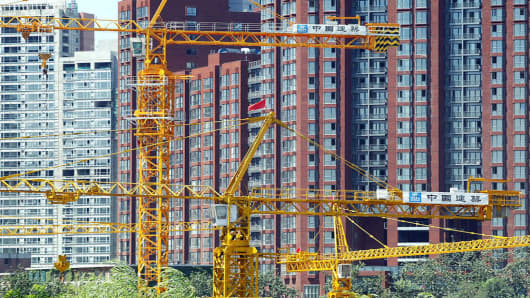South Korean construction stocks have lost almost 20 percent of their value this month, falling to levels last seen four years ago, after huge losses at two firms sparked widespread fears of overseas projects going sour.
After the 2008 financial crisis, South Korean builders such as Samsung Engineering and GS Engineering & Construction won a raft of foreign orders, particularly in the Middle East.
Some of those contracts have turned into losers as fierce competition has driven down prices, and inexperience in new areas has meant extra costs. Some builders' earnings are likely to suffer as many large-scale but low-margin projects approach completion this year and next, analysts say.
"There is a high chance of more bad news for builders... It is risky to invest in South Korean builders until they show sustained earnings improvements," said Byun Seong-jin, an analyst at Mirae Asset Securities.
(Read More: South Korea Sets Modest Stimulus Spending)
"After peaking in 2009, the petrochemical/refinery plant markets shrank as China lost momentum, forcing builders to make lower-priced bids and venture into new areas," he said.
Samsung Engineering, which recently posted its first quarterly operating loss since 2003, has the biggest order backlog of 5.5 trillion won ($4.92 billion), including hydrocarbon plants in the Middle East and other low-margin overseas business it secured between 2009 and 2012, according to an April report by brokerage Korea Investment & Securities.
Earlier this month the engineering unit of South Korea's biggest conglomerate Samsung Group reported an operating loss of 219.8 billion won.
Samsung Engineering said its earnings were hurt by additional costs of about 300 billion won in two projects including one to build a chlor-alkali plant in the United States for a joint venture between Dow Chemical and Mitsui & Co by the end of this year.
Lack of understanding of business conditions in new markets and risk arising from moving into new products resulted in big cost increases in some projects, the firm said in a statement.
"Other projects are on track according to our plans. We foresee no problems in reporting yearly profits of an estimated 350-400 billion won before taxes in 2013, as profitability steadily recovers from the second quarter," said Charley Choi, a spokesman for Samsung Engineering.
Conservatism vs Aggression
Across the sector, the decision to chase foreign orders that have turned out to be unprofitable is expected to hurt bottom lines in the coming quarters as they near completion.
(Read More: We Want to Avert US-Style Fiscal Cliff: South Korea Fin Min)
"South Korean construction firms adopted low-cost, aggressive order strategies in 2009, 2010, and 2011 to a lesser extent," said Heu Moon-wook, an analyst at KB Investment & Securities. "As overseas projects on average take about three years for completion, low-cost orders are expected to weigh on earnings until the first half of 2014," he said.
GS E&C has an order backlog of 4.1 trillion won and Daelim Industrial has 3.4 trillion won, according to the report by Korea Investment & Securities.
Despite market expectations that it would make money, GS E&C said on April 10 that it had swung to an operating loss of 535.5 billion won in the first quarter from a year earlier, hit by massive losses on its overseas projects. The biggest factor was a loss of 405 billion won at two projects in the United Arab Emirates, due for completion early next year.
GS E&C estimated it will sustain about 800 billion won in operating losses this year.
"The effect of low-priced projects that GS E&C took on between 2009 and 2010 are expected to last only until the first half of 2014. Projects taken on since then have tended to better conditions," said Son Jaun, a spokesman for GS E&C.
Shares in GS E&C were down 44 percent in the past month as of Friday, while Samsung Engineering has slumped 33 percent.
(Read More: Abenomics Anxiety Doesn't Last Long for South Korea)
By contrast, their rival Daelim Industrial beat market expectations with first-quarter operating profit of 124 billion won, reaping the benefit of a more conservative approach which shied away from risky orders, analysts said.
"We focused our efforts on relatively profitable power plants in Southeast Asia, reducing dependence on hydrocarbon plants in the Middle East where competition intensified. Rather than recklessly venturing into new markets, we have focused on products in which we have a track record," the company said in a statement.


